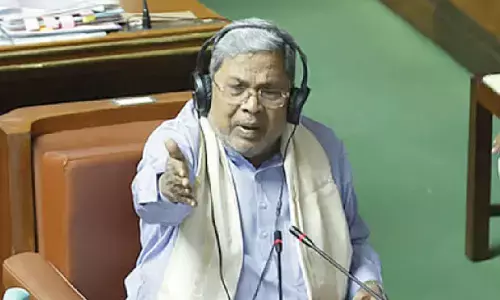Assam govt's forced eviction move turns controversial

Assam govt’s forced eviction move turns controversial
Assam Chief Minister Himanta Biswa Sarma, last month, said that his government would continue its eviction drive against illegal settlers
Assam Chief Minister Himanta Biswa Sarma, last month, said that his government would continue its eviction drive against illegal settlers. He also promised to accommodate them by providing 6 bigha land to genuine landless people.
"The drive will continue. The government will look into the problems of the poor and landless people but we cannot allow one person to occupy 100 bigha, 200 bigha government land. We will provide 6 bigha land to the genuine landless people as per the criteria of my government's land use policy", he added. This assurance came after two farmers were shot dead in Darrang in the State in one such drive.
The happenings in the North East usually do not make headlines except when there is violence. Even if it does, it does not last long. A minor issue in the cow belt of North India would soon overtake it. Still, it does not mean that a State government could go ahead with such programmes that affect the very livelihoods of the deprived members of the society.
The Opposition has been demanding immediate relief to the evicted persons and also a halt to the drive. However, this plea does not get registered at all with the government. It is nobody's case that the governments don't know about encroachments. All of them do know. Why do they keep quiet when it happens in the first place?
Why do they then resort to forced evictions? If they have a plan to rehabilitate them, why don't they first implement the same? Has any land survey been conducted and any verification done in Assam? Those encroachers in Assam, like in any other State of India, are not rich by any yardstick. These could be migrant populations, but had been allowed to settle down in India.
There is a law against such evictions. It is mandatory on part of governments to follow the laws. Forced evictions constitute gross violations of a range of internationally recognised human rights, including the human rights to adequate housing, food, water, health, education, work, security of the person, freedom from cruel, inhuman and degrading treatment, and freedom of movement.
Forced evictions are often linked to the absence of legally secure tenure, which constitutes an essential element of the right to adequate housing. Those share many consequences similar to those resulting from arbitrary displacement, including population transfer, mass expulsions, mass exodus, ethnic cleansing and other practices involving the coerced and involuntary displacement of people from their lands and communities.
The United Nations defines forced evictions 'as the permanent or temporary removal against their will of individuals, families and/or communities from the homes and/or land which they occupy, without the provision of, and access to, appropriate forms of legal or other protection'.
As a result of forced evictions, people are often left homeless and destitute, without means of earning a livelihood and often with no effective access to legal or other remedies. Forced evictions intensify inequality, social conflict, segregation and invariably affect the poorest, most socially and economically vulnerable and marginalized sectors of society, especially women, children, minorities and indigenous peoples.
The obligation of States to refrain from, and protect against, forced evictions from home(s) and land arises from several international legal instruments including the Universal Declaration of Human Rights, the International Covenant on Economic, Social and Cultural Rights (art. 11, para. 1), the International Covenant on Civil and Political Rights (art. 17, 23 and 27) the Convention on the Rights of the Child (art. 27, para. 3), the non-discrimination provisions found in article 14, paragraph 2 (h), of the Convention on the Elimination of All Forms of Discrimination against Women, and article 5 (e) of the International Convention on the Elimination of All Forms of Racial Discrimination.
In its resolution 1993/77, the Commission on Human Rights stated that the "practice of forced eviction constitutes a gross violation of human rights, in particular of the right to adequate housing".
Still, our governments continue to violate human rights with impunity. Can't the governments' be humane at least to some extent? Is all that violence necessary and all the displacement? These marginalised sections will be open for further exploitation having been deprived of what little they have. Should we welcome these moves? If a drive is inevitable then why not rehabilitate such marginal squatters first?














